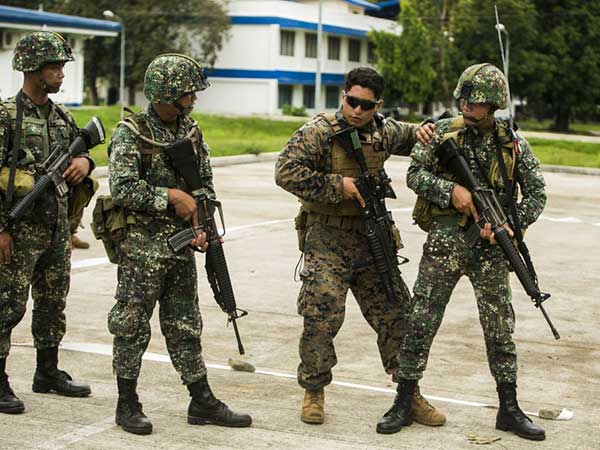Repeated attacks on U.S. forces carry messages, embarrass Iraqi gov't
May 22, 2021

Baghdad (Iraq) May 22: The repeated attacks by Iraqi militias acting outside of state authorities on the U.S. embassy and U.S.-led coalition forces across the country are holding internal and external messages.
The attacks against Iraqi military bases housing U.S.-led coalition forces in the provinces of Anbar, Salahudin, and Erbil were carried out by shadowy militant groups to pressure U.S. forces to leave Iraq.
Earlier this month, Iraqi Prime Minister Mustafa al-Kadhimi told local media that "the absurd rockets do not target the Americans," stressing that the Iraqi military bases are only housing U.S.-coalition advisers and trainers for the Iraqi forces.
Al-Kadhimi's comment came after U.S. experts and advisers for F-16 fighter jets withdrew from Balad Air Base, some 80 km north of capital Baghdad, after a series of rocket attacks targeted the base in Iraq's Salahudin province.
"Balad Air Base contains Iraqi aircraft and Iraqi forces, and what is happening embarrasses Iraq," al-Kadhimi said.
The militia's attacks did not cause serious human and material losses, but strongly caused embarrassment to al-Kadhimi, who has said that bringing armed groups under state control is a goal of his administration but finds himself increasingly helpless in reining the groups.
Nadhum Ali Abdullah, an Iraqi political analyst in the Arab Forum for Iranian Policy Analysis, told Xinhua that the militias' attacks bear local, regional, and international messages.
Locally, Iraqi Shiite militant groups close to Iran have always tried to strengthen Iranian influence in Iraq and the region in general, according to Abdullah.
"Iraqis are afraid of the growing role of the uncontrolled militias because they have the power of weapons and money that enable them to directly influence the security, political and economic situation in the country," Abdullah added.
On the regional level, the militias want to ensure that any strengthening of relations between Iraq and the Arab world, especially Saudi Arabia, won't be at the expense of Iran's interests in Iraq, he said.
Abdullah also believes that Iran's negotiations with the United States over the Iranian nuclear file were at the core of the attacks.
"The rocket attacks can support the Iranian position in the nuclear negotiations, as the Iranian side can maneuver the issue of militias with addressing the nuclear file," Abdullah concluded.
Abdul-Aziz al-Jubouri, another Iraqi political analyst and a teacher at Media College at the Iraqiya University in Baghdad, told Xinhua that the attacks embarrassed al-Kadhimi and Iraqi negotiators during the rounds of the so-called U.S.-Iraqi strategic dialogue.
Four rounds of the strategic dialogue have been held so far between the two sides since June 2020. The meetings aimed to discuss a timetable to withdraw U.S.-led coalition combat troops outside the country, in addition to discussing security and counterterrorism, economics and energy, political issues, and cultural relations.
"The latest dialogue round was held on April 7, 2021, under the request of the Iraqi government, partly in response to pressure from Shiite political parties close to Iran that have frequently demanded the remaining U.S. forces to leave Iraq," al-Jubouri said.
A joint statement by the video teleconference meeting said that the two sides agreed to redeploy the remaining U.S.-led coalition combat troops outside Iraq in light of the increasing capacity of the Iraqi security forces in fighting against the extremist Islamic State (IS) group.
The statement avoided mentioning full withdrawal from Iraq, and the U.S. intention was clear when the top commander of U.S. Central Command Kenneth McKenzie told U.S. lawmakers later in April that he does not foresee a full U.S. withdrawal from Iraq.
"The United States seeks to keep some 2,500 U.S. troops in Iraq under the pretext of ensuring the IS extremist group will not be able to reconstitute itself, and this only means the continuation of the proxy conflict on Iraqi soil between U.S. forces and Shiite groups loyal to Iran," al-Jubouri added.
Many Shiite militias surfaced in Iraq, particularly after Jan. 3, 2020, when a U.S. drone struck a convoy at Baghdad airport, which killed QassemSoleimani, former commander of the Quds Force of Iran's Islamic Revolution Guards Corps, and Abu Mahdi al-Muhandis, deputy chief of Iraq's paramilitary HashdShaabi forces.
Their death in the U.S. airstrike outraged many Iraqi lawmakers in the parliament to pass a resolution after two days of the airstrike, requiring the government to end the presence of foreign forces in Iraq.
"The parliament resolution to end the presence of foreign forces in Iraq has been used repeatedly by some Shiite factions to legitimize their attacks against U.S. forces in Iraq, and some political parties have used it to pressure al-Kadhimi's government to demand U.S. forces to leave Iraq," al-Jubouri concluded.
Source: Xinhua









